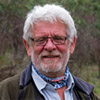


 Rudi van Aarde Rudi van Aarde 
Emeritus Professor | Chair of Conservation Ecology
rjvaarde@zoology.up.ac.za
I lead the Conservation Ecology Research Unit (CERU) as a self-sufficient research entity funded via grants from national and international organisations and private industries. These grants also support research fellows, support staff, and post-graduate bursaries. My research on elephants focuses on the drivers of demographic variability and heterogeneity in spatial utilization, with emphasis on finding solutions for the causes rather than symptoms of so called 'elephant problems'. This research is conducted across gradients of environmental and management conditions in southern African protected areas.
Our research on the restoration of coastal dune forests in northern KwaZulu-Natal started 28 years ago. Coastal dune forest is rare in South Africa and falls within the Maputaland-Pondoland-Albany biodiversity hotspot. Some 10% of this forest is protected, but 43% has been transformed. The remaining 57% is threatened by tourism, dune mining, and clearing for subsistence living. The narrow and linear nature of the forest further contributes to its sensitivity to transformation, isolation, and fragmentation, and its restoration makes both conservation and economic sense. View Professor van Aarde's CV

 Stuart Pimm Stuart Pimm
Extraordinary Professor
stuartpimm@me.com
I am Professor of Conservation Ecology at Duke University, Extraordinary Professor within the Department of Zoology and Entomology, and Director of Saving Nature. I am one of the world’s most highly cited and influential environmental scientists and an internationally recognized global leader in the study of biodiversity, especially present-day extinctions and what the world can do to prevent them. My accolades include the 2019 International Cosmos Prize, the Tyler Prize for Environmental Achievement (2010), and the Dr. A.H. Heineken Prize for Environmental Sciences from the Royal Netherlands Academy of Arts and Sciences (2006). My work currently focuses on reducing human-wildlife conflict in Africa, Asia and elsewhere. I have worked in the wet forests of Colombia, Ecuador and Brazil for decades, and is a long-term collaborator on the Forest Fragmentation Project in the Brazilian Amazon. I am the author of over 350 scientific papers and five books, including the highly acclaimed assessment of the human impact to the planet: The World According to Pimm: a Scientist Audits the Earth.

 Robert Guldemond (M.Inst.Agrar., PhD) Robert Guldemond (M.Inst.Agrar., PhD)  
Research Fellow
rguldemond@zoology.up.ac.za
I coordinate and administer all the research activities at CERU. The rehabilitation of disturbed sites to sustainable and functioning ecosystems is one way to mitigate our negative impact on the environment. However, successful restoration requires continuous research and monitoring. Our study site north of Richards Bay relies on natural processes such as succession and patch-dynamics to drive recovery of dune forest after mining. One component of my research focuses on community structure and composition of birds, small mammals, trees, herbs, millipedes, and dung beetles in regenerating dune forest during early, mid, and late successional stages, as well as in un-mined old growth forests.
My research on elephants started some 20 years ago with special emphases on evaluating the impact that elephants have for other species and for vegetation. More recently I have extended my activities to include the demographic profiling of elephant populations with emphases on how numbers influence survival and breeding schedules.

 Hannes Louw (MSc, DTech) Hannes Louw (MSc, DTech)
Research Fellow
cjlouw@up.ac.za
I specialise in the temporal dynamics of large mammal populations in response to environmental conditions and population densities. To this end I use age-specific demographic responses of elephant populations exposed to varying environmental and management conditions to evaluate the consequences that these had for elephants, and to use the outcomes of my research in the design of future management options for elephant populations across southern Africa.

 Camilla Nørgaard (MSc) Camilla Nørgaard (MSc)
Research Assistant
cnorgaard@zoology.up.ac.za
CERU's development of a routine to extract demographic information from free-ranging elephants relies on getting accurate measures of the back lengths of elephants in breeding herds. We use digital images that we make during dedicated aerial sorties from a helicopter. I measure elephants' back lengths and convert these to age using elephant growth models that we have developed at CERU. This enables me to determine estimates for age at sexual maturity, calving intervals, and age structures for each sub-population we survey. This information is used to model age-specific survival and fecundity rates as well as the intrinsic growth rates of populations. Each year we do this for some five to six thousand elephants in five to six populations.

 Jo Fourie Jo Fourie
Research Assistant
jfourie@zoology.up.ac.za
I am responsible for all logistical and technical support for staff and students in their research activities. I develop and curate maps illustrating the distribution of current elephant numbers in protected areas across southern Africa and assist in the bird and millipede surveys in the coastal dune forests of South Africa.

 Celesté Maré (MSc) Celesté Maré (MSc)
Research Assistant
celeste.mare@up.ac.za
I curate CERU's database on elephant numbers, distribution and demography of elephant populations across southern and East Africa. I use this information to model trends in numbers for each elephant population and clusters of populations as part of our work on metapopulation dynamics. I also assist with any fieldwork responsibilities in coastal dune forests.

 Jarryd Outram (BSc) Jarryd Outram (BSc)
Research Assistant
jm.outram@up.ac.za
My main responsibility is to assist Camilla in compiling the age structures of elephant populations as part of REPA and to curate all related data files. I have a keen interest in birds and conduct surveys as required by CERU's forest programme and elsewhere. With Jo I am responsible for ground surveys related to CERU's surveys on elephants. At present, I also source all available information to summarise the historical management practices of the elephant populations in South Africa.


 Alida de Flamingh (MSc, PhD) Alida de Flamingh (MSc, PhD)
Post-doctoral Fellow
deflami2@illinois.edu
My post-doc is jointly supervised by Professors Al Roca and Rudi van Aarde and funded by IFAW through CERU. I use a conservation genomic approach to study African elephant populations to map out functional linkages within and between elephant populations across southern Africa. The design of these linkages relies on integrating spatial information on elephant movement to their historical and contemporary genetic profiles. I also have the responsibility in overseeing CERU's genetic database for elephants.

 Ryan Huang (BSc, PhD) Ryan Huang (BSc, PhD)
Post-doctoral Fellow
ryan.huang@duke.edu
I am jointly supervised by Professors Stuart Pimm and Rudi van Aarde and funded by CERU. I specialise in metapopulation ecology in a modeling environment to help set conservation priorities. I use spatially-explicit and remotely-sensed data of landscapes and people which I combine with elephant population characteristics to design potential connectivity between populations and conservation clusters for metapopulation persistence across southern Africa.

 Jessica Bucciarelli Jessica Bucciarelli
MSc candidate
jessicarbucciarelli@gmail.com
I am a Masters student supervised by Professors Rudi van Aarde and Stuart Pimm and I work on modeling elephant movements in and between protected areas across southern Africa using satellite tracking data. My project focusses on building predictive models to parameterise metapopulation models to set priorities for further conservation actions for elephants in southern Africa.
|

